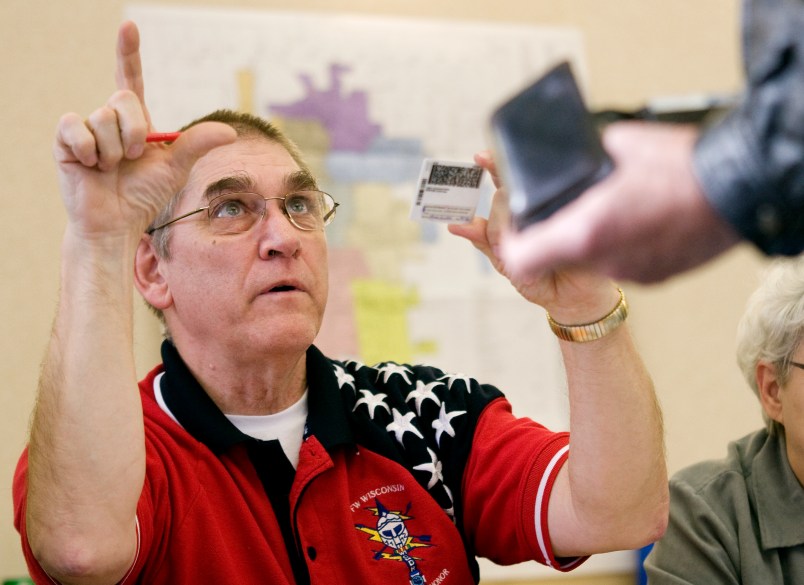MADISON, Wis. (AP) — A judge must consider whether Wisconsin’s voter photo identification law applies to people who face daunting obstacles in obtaining identification, a three-judge federal appellate panel ruled Tuesday.
The American Civil Liberties Union and the National Law Center for Homelessness and Poverty filed a federal lawsuit in 2011 challenging the law. U.S. District Judge Lynn Adelman struck the law down in April 2014, saying it unfairly burdens poor and minority voters who may lack such identification.
But a three-judge panel from the 7th Circuit U.S. Court of Appeals ultimately reversed him and upheld the law that October, ruling Wisconsin’s law is substantially similar to one in Indiana that the U.S. Supreme Court declared constitutional. The law was in effect for last week’s presidential primary.
The ACLU and the national homeless center have continued to argue, however, that voters who face stiff hurdles in getting a photo ID should be allowed to vote by affidavit. They say those voters include people who can’t obtain IDs because of name mismatches or other errors in birth certificates or other necessary documents; those who need a credential from another agency such as the Social Security Administration that they can’t get without a state photo ID; or those who need a document that no longer exists.
Judges Michael Kanne, Frank Easterbrook and Diane Sykes wrote Tuesday that Adelman must consider those arguments and sent the case back to him.
The panel noted that Indiana’s law allows people who can’t obtain a photo ID for financial or religious reasons to file an affidavit to that effect and have their vote provisionally counted.
Wisconsin’s law allows voters who lack IDs to vote provisionally as well, but they must produce an ID for election officials by the end of the week.
“Indeed, one may understand plaintiffs as seeking for Wisconsin the sort of safety net that Indiana has had from the outset,” the appellate judges wrote Tuesday.
The ruling didn’t disturb the voter ID law as a whole; it remains in full effect. But ACLU Voting Rights Project attorney Sean Young said the group was thrilled with the ruling.
“Today the appeals court ruled that courthouse doors cannot be shut to those who are most impacted by the voter ID law,” Young said.
The state Justice Department is defending the law. Agency spokesman Johnny Koremenos said in an email to The Associated Press that the panel ordered Adelman to consider only a narrow issue in the case and agency attorneys were confident they would prevail.
___
Follow Bryna Godar on Twitter at https://twitter.com/bgodar .
___
Follow Todd Richmond on Twitter at https://twitter.com/trichmond1 .
Copyright 2016 The Associated Press. All rights reserved. This material may not be published, broadcast, rewritten or redistributed.







I can’t imagine the Founding Fathers intended for disenfranchisement to be this damned difficult. They managed to establish a system that excluded Blacks and women for nearly a century or more, why all the fuss now?
Just it blacks and women… what must a poor white male victim do…
What information is needed for someone to register to vote in Wisconsin?
So if the following list is acceptable forms of proof to register, then, that’s all you should need to actually vote!
VOTER REGISTRATION QUALIFICATIONS
Age: Must be 18 years or older on Election Day
Citizenship: Must be a United States citizen
Residency: Must be a resident of Wisconsin
Felony Convictions: Rights restored upon completion of sentence, including prison, parole, and probation. If you are in jail serving a misdemeanor sentence or awaiting tria, you are eligible to vote.
ID Requirements:Registration requires proof of residence. The following constitute acceptable proof-of-residence if the document contains your current name and address
-A current and valid Wisconsin driver license.
-A current and valid Wisconsin identification card.
-Any other official identification card or license issued by a Wisconsin governmental body or unit.
-Any identification card issued by an employer in the normal course of business and bearing a photo of the card holder, but not including a business card.
-A real estate tax bill or receipt for the current year or the year preceding the date of the election.
-A residential lease that is effective on date of registration (NOT for first-time voters registering by mail).
-A university, college or technical institute identification card (must include photo), ONLY if the voter provides a fee receipt dated within the last nine months or the institution provides a certified housing list to the municipal clerk.
-A gas, electric or telephone service statement (utility bill) for the period commencing no earlier than 90 days before election day.
-Bank statement
-Paycheck
-A check or other document issued by a unit of government
-A letter on public or private social service agency letterhead identifying a homeless voter and describing the individual’s residence for voting purposes
This is a step, but only a small one, in the right direction. The essential problem–outside of partisanship on the bench–is that legal reasoning permits judges to divorce themselves almost entirely from what is really going on.
The proof of residence is a huge kicker. If you’re currently jobless and homeless (often happens with joblessness) you’ll have none of these “acceptable IDs”. Even if you have a driver’s license or the like, the address would not be correct so it would be invalidated. If you could afford to get a WI ID card it wouldn’t have a valid address either. So… just how are the poorest and most disadvantaged of us to vote? Oh the last item? Sure, this poor guy/gal knows just where and how to get this, and can get the necessary appointment and provide whatever information they require to write that letter. This would include transportation etc., not to mention physical ability to travel to get it.
On the face of it it sounds so easy… and it is, for those of us who don’t have a problem. Us privileged folks.